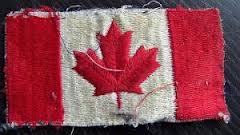Wandering Canadian Baby Boomers and Gen-Xers of yesteryear knew that travelling around the globe was a lot easier for us than it was for our American brethren. This was undoubtedly the result of our good standing throughout the world and our reputation as a sane and progressive country on almost all issues, both international and domestic.
Many of us who travelled around other countries considered it wise to sew a Canadian flag on our backpacks and show it prominently.
(Disclosure: Throughout much of the 1970s and into the early 1990s, I was one of those backpackers bouncing about the planet, proud to be a Canadian, the flag always prominently displayed.)
Indeed, it was so cool to be a travelling Canadian that there were countless stories of Americans travelling with a Canadian flag on their backpacks. They did this so as not to incur the wrath of the locals who held anti-American sentiments. I even met a few of them.
Why were Canadians so popular?
Well, for a variety of reasons. Of course, the courage exemplified by our soldiers in both World Wars was a large reason for our popularity, especially in Europe. So was our reputation as a peace loving nation, which was undoubtedly enhanced by the role played by Lester Pearson in the Suez Canal Crisis of 1956, a role that garnered Pearson the Nobel Peace Prize. Canadian troops became known as “peace keepers,” a term that does not engender the warm reception in these conservative times that it did only a short time ago.
From what I have been told by several young Canadian millenials who have travelled across Europe in recent years, the reception is not nearly as warm when locals learn that the backpacker in front of them is from Canada. Mind you, they did not tell me that locals hurled rotten tomatoes at them, just that they did not see a friendly smile appear on the lips of the people they were speaking with.
What happened? Why are Canadians not as warmly embraced when they travel abroad?
Here are some of my speculations.
First, Canada was by and large known for its concern over the state of our environment and the health of the planet itself. It should come as no surprise, even to conservatives, that our current federal government has not presented itself as a leader in preserving and protecting the environment. In fact, Canada is now seen as an obstacle in reaching international agreements on the Climate Change crisis. In Copenhagen, as well as at other international summits on Climate Change, Canada presents itself as a representative of Big Oil. Prime Minister Harper and other Conservative cabinet ministers only exacerbated the situation when they called Canadian environmentalists “eco-terrorists” funded by radical foreigners.
In the international arena, Canada is now seen as a having a very regressive position on environmental issues. This is clearly a change from even less than a decade ago. It is no wonder that in late 2009 the international Climate Action Network gave Canada the “Fossil of the Year” Award at the International Climate Change Conference in Copenhagen. In fact, Canada recently won this dubious award for the sixth straight year!
What else could be fuelling Canada’s fall from grace on the international stage?
The Middle East. Almost everyone on the planet knows that this is an extremely complex geopolitical region of the world. Yet, since the federal Conservatives came to power in 2006, Canada has been the biggest international supporter for anything the Israeli government does. There are many people, in Europe but even here in Canada (not to mention in the Middle East itself), that do not appreciate our government’s unconditional support for the Israeli government. This is not an anti-Israeli position. Nor is it anti-Semitic. It is a perspective that acknowledges the need for a nuanced and balanced approach toward international diplomacy with the goal of peace in a very volatile part of the world.
International diplomacy, however, is not a strong suit of Canada’s Conservative government. Just this past week, former Prime Minister Joe Clark unequivocally stated that “Harper should have known better” than to pontificate about democracy in destitute African countries without trying to help them. Mr. Clark described how seriously even Brian Mulroney took the notion of helping these countries. We know that Canada’s international reputation has drastically diminished when past Conservative leaders are appalled at what is happening.

Moving along.
For many years Canada supplied financial support to help poor war-torn countries such as Bosnia get rid of buried landmines. In fact, in 1997 Canada spearheaded an international movement that has become known as the Ottawa Treaty. This watershed agreement, signed by 125 nations, promised an end to landmine production, to destroy stockpiles, and to clear those still in the ground. In 2012, the Harper government announced that funding landmine removal is too costly! They have drastically reduced financial support for this very humane project, instead putting this money toward such things as the procurement of ridiculously expensive F-35 stealth jets. Now that’s embarrassing, not to mention immoral.
But there is more.
Canada has never treated its Indigenous peoples fairly. Yet, in recent years even this sorry state of affairs has taken a few steps backward. In 2007, Canada was one of four nations that refused to sign the United Nations Declaration on the Rights of Indigenous Peoples. And less than a fortnight ago, a UN investigator said Canada is facing a “crisis” when it comes to the situation facing Aboriginal peoples.
Lastly, the Harper government’s relentless war on Canada’s scientific community is becoming known in international circles. A recent New York Times column attests to this.
It is no wonder that the United Nations rejected Canada’s bid for a seat on the Security Council in 2010. It saddened me to hear prominent Conservative politicians and their media pundits react to the UN rejection by denigrating this umbrella organization of the world’s nations. And truth be told, I could understand why the UN rejected Canada’s bid.
Doing nothing positive about the environment. Furthering the interests of Big Oil in an era of Climate Change. Supporting unconditionally only one side in Middle East struggles. Presenting to the international community as a hawkish nation rather than as a peace-loving nation. Disrespecting Aboriginal peoples, scientists, and the United Nations whenever it suits them. These are the actions taken by the Harper Conservatives since coming to power in 2006.
If I were still one of those young Canadians backpacking around the globe, I would take the Canadian flag off of my backpack, too. It’s just not that cool a symbol anymore. Perhaps I will feel differently one day. But for this to happen, Canada will have to demonstrate the kind of leadership it showed in past years, before the Harper Conservatives came to represent us in the international arena.



